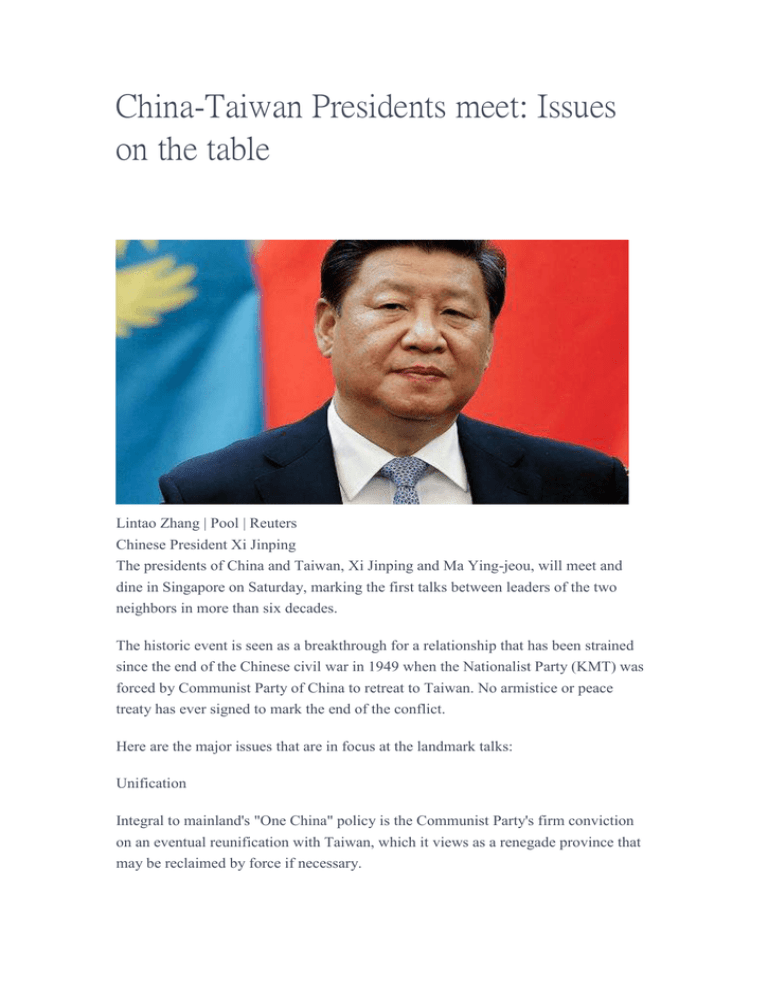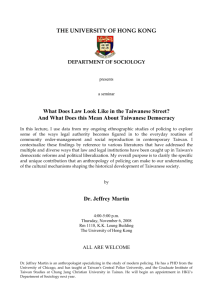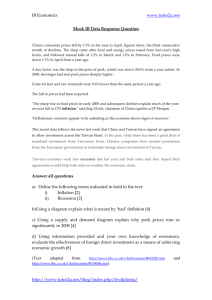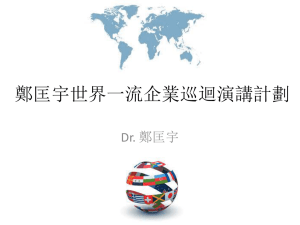China-Taiwan Presidents meet: Issues on the table
advertisement

China-Taiwan Presidents meet: Issues on the table Lintao Zhang | Pool | Reuters Chinese President Xi Jinping The presidents of China and Taiwan, Xi Jinping and Ma Ying-jeou, will meet and dine in Singapore on Saturday, marking the first talks between leaders of the two neighbors in more than six decades. The historic event is seen as a breakthrough for a relationship that has been strained since the end of the Chinese civil war in 1949 when the Nationalist Party (KMT) was forced by Communist Party of China to retreat to Taiwan. No armistice or peace treaty has ever signed to mark the end of the conflict. Here are the major issues that are in focus at the landmark talks: Unification Integral to mainland's "One China" policy is the Communist Party's firm conviction on an eventual reunification with Taiwan, which it views as a renegade province that may be reclaimed by force if necessary. While China has signaled that Taiwan can be governed under a "one country, two systems" like what is in place in the former British colony of Hong Kong, Taiwan is wary of the proposition. After decades of martial law, young Taiwanese who grew up in a lively democracy are also increasingly disengaged from communist China, particularly after the central government was seen to be interfering in how Hong Kong chooses its leaders, prompting widespread street protests in 2014. Cross straits relations Relations between China and Taiwan have been testy for decades, with the prospect of a military confrontation on the Taiwan Strait a geopolitical risk for the region. Leaders of the two territories are expected to discuss the status of this amorphous relationship based on what is known as the "1992 Consensus", a tacit understanding reached that year at a meeting between semi-official representatives that acknowledges that there is only one China—although the mainland and Taiwan can have their own interpretation of what that stands for. On Saturday, Taiwan will emphasize its stance on the importance of maintaining the status quo in this relationship as most Taiwanese are neither for independent rule from China nor for reunification, said Ma at a press conference Thursday. Taiwan presidential elections Opposition pro-independence Democratic Progressive Party is expected to win the election in January, throwing a spanner into improving cross straits ties cultivated under Ma's KMT leadership. The DPP is now accusing China of trying to influence the election by using the meeting to signal that ties with China will improve if the pro-China KMT retains the leadership of Taiwan. Meanwhile, Ma is seen as using the meeting to shore up flagging support for KMT. Sovereignty Since taking office in 2008, Taiwan's Ma has signed a series of landmark trade and economic agreements with China. The mainland government however has long resisted a meeting of heads of state due to fears that it would be seen as conferring legitimacy on the Taiwanese government. As it stands, countries seeking diplomatic relations need to takes sides, with rising world power China increasingly gaining the upper hand. Ma said he would raise the issue of Taiwan's diplomatic isolation during the talks. On Saturday, Xi and Ma will skirt around the issue of sovereignty by addressing each other as "Mr" rather than "President". They will also split the dinner bill, reported Reuters, citing a Taiwanese official. Next steps While historic, the meeting in Singapore at the Shangri-la Hotel is unlikely to culminate in any dramatic announcements. No agreements would be signed or joint statements agreed to, Ma's office said in a statement Former Singapore foreign minister George Yeo however is sanguine, saying in a statement on Wednesday that that the meeting will "alter the psychology of cross straits relations in a positive way for years to come" and will help the next president of Taiwan begin his term in a better position.




